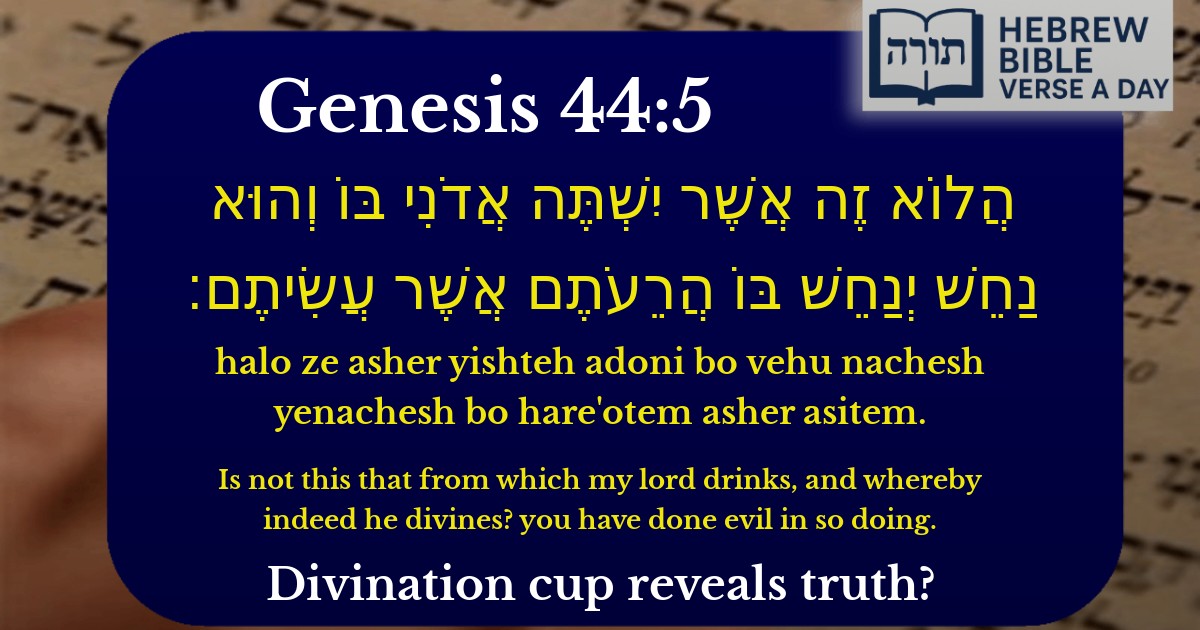Frequently Asked Questions
Q: What does Genesis 44:5 mean?
A: In Genesis 44:5, Yosef's (Joseph's) steward accuses his brothers of stealing Yosef's special goblet, which he uses for drinking and also for divination (נַחֵשׁ). According to Rashi, this verse shows Yosef's strategy to test his brothers' repentance by framing them for theft, mirroring how they had once 'stolen' him from their father. The term 'divination' here refers to a practice common in ancient times, though the Torah later forbids it (Devarim 18:10).
Q: Why did Yosef use a goblet for divination?
A: The Midrash (Bereshit Rabbah 92:5) explains that Yosef did not actually practice divination, as it is forbidden by the Torah. Rather, he pretended to use the goblet for this purpose to maintain his disguise as an Egyptian ruler and to test his brothers. Ramban adds that Yosef may have used it for reading patterns (like coffee grounds), a common practice in ancient Egypt, but not true sorcery.
Q: What lesson can we learn from Genesis 44:5?
A: This verse teaches the importance of teshuvah (repentance) and accountability. Yosef orchestrated this situation to see if his brothers would abandon Binyamin (Benjamin) as they had once abandoned him. The Talmud (Chagigah 4b) derives from here that Hashem arranges circumstances to give people opportunities to rectify past mistakes. The brothers' willingness to protect Binyamin showed their growth.
Q: Why is the goblet mentioned as both for drinking and divination?
A: Rashi explains that the double description ('drinks' and 'divines') emphasizes the goblet's importance to Yosef, making the accusation more severe. The Kli Yakar adds that it hints at two levels of wrongdoing—theft and disrupting Yosef's supposed divine guidance. This heightened the brothers' fear and forced them to confront their moral dilemma fully.
Q: How does this verse connect to the broader story of Yosef and his brothers?
A: This moment is the climax of Yosef's test for his brothers. The Sforno notes that the 'evil' (הֲרֵעֹתֶם) they are accused of parallels their earlier sin against Yosef (Genesis 37:2). By framing them, Yosef recreates their past crime to see if they’ve changed. Their refusal to abandon Binyamin proves their teshuvah, leading to the family’s reconciliation.


Context of the Verse
This verse (Bereshit 44:5) is part of the narrative where Yosef's brothers are accused of stealing his silver goblet. The speaker (Yosef's steward) confronts them, emphasizing the gravity of their alleged theft by pointing out that the goblet is not merely a drinking vessel but also used for divination.
Literal Interpretation (Peshat)
Rashi explains that the phrase "וְהוּא נַחֵשׁ יְנַחֵשׁ בּוֹ" ("and whereby indeed he divines") refers to Yosef's practice of using the goblet for nichush (divination). According to Rashi, this was a method of gazing into the cup to discern hidden matters, a practice known in ancient times. The steward highlights the severity of the theft by noting its sacred or mystical use.
Moral and Ethical Implications (Derash)
The Midrash (Bereshit Rabbah 92:7) delves into the ethical dimension of the accusation. The brothers are shocked by the claim, as stealing—especially an item used for divine purposes—would be a grave sin. The Midrash suggests that this moment serves as a test of their repentance for having sold Yosef, forcing them to confront false accusations just as Yosef had suffered unjustly.
Yosef’s Intentions
Rambam (Hilchot Avodah Zarah 11:16) discusses the prohibition of divination but notes that Yosef’s claim may have been a ruse to test his brothers. Since Yosef was a righteous man (tzaddik), it is unlikely he actually practiced forbidden divination. Instead, he used this accusation to gauge their moral growth and whether they would stand up for Binyamin, demonstrating their changed character.
Theological Significance